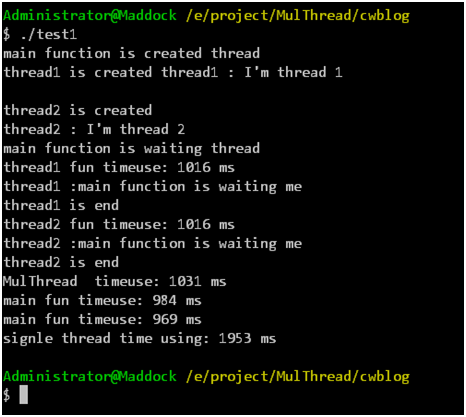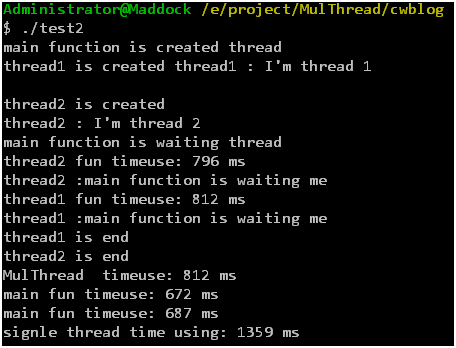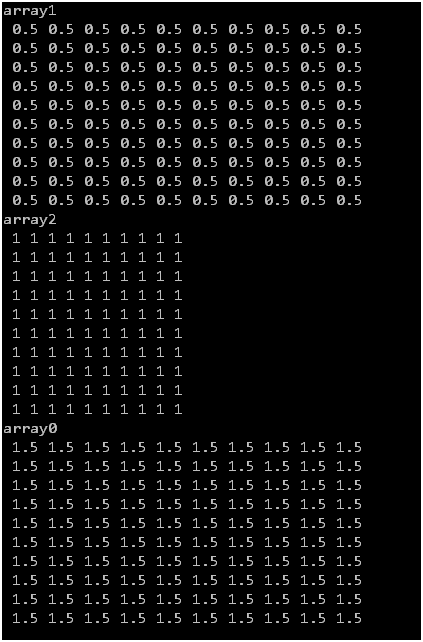参考:
http://www.cnblogs.com/armlinux/archive/2010/05/28/2396997.html
http://blog.csdn.net/hitwengqi/article/details/8015646
http://www.vimer.cn/2009/11/linux%E4%B8%8B%E5%A4%9A%E7%BA%BF%E7%A8%8B%E7%9A%84%E5%88%9B%E5%BB%BA%E4%B8%8E%E7%AD%89%E5%BE%85%E8%AF%A6%E8%A7%A3.html
http://www.cnblogs.com/skynet/archive/2010/10/30/1865267.html
http://www.cnblogs.com/vamei/archive/2012/10/09/2715393.html
最近在优化一个图像处理算法,算法中要对于不同的图片做相同的图像处理算法,不同图片之间的处理数据时独立的,因而很自然的想到利用多线程优化算法。
下面是一些学习代码
一 Linux下面的多线编程需要包含明白以下几点:
1 pthread_t
pthread_t在头文件/usr/include/bits/pthreadtypes.h中定义:
typedef unsigned long int pthread_t;
它是一个线程的标识符。
2 pthread_create
函数pthread_create用来创建一个线程,它的原型为:
extern int pthread_create __P ((pthread_t *__thread, __const pthread_attr_t *__attr,
void *(*__start_routine) (void *), void *__arg));
第一个参数为指向线程标识符的指针;
第二个参数用来设置线程属性;
第三个参数是线程运行函数的起始地址;
最后一个参数是运行函数的参数。
这里,我们的函数thread不需要参数,所以最后一个参数设为空指针。
第二个参数我们也设为空指针,这样将生成默认属性的线程。
对线程属性的设定和修改我们将在下一节 阐述。
当创建线程成功时,函数返回0,若不为0则说明创建线程失败,常见的错误返回代码为EAGAIN和EINVAL。
前者表示系统限制创建新的线程,例 如线程数目过多了;
后者表示第二个参数代表的线程属性值非法。
创建线程成功后,新创建的线程则运行参数三和参数四确定的函数,
原来的线程则继续运行下一行 代码。
3 pthread_join 和pthread_exit
函数pthread_join用来等待一个线程的结束。函数原型为:
extern int pthread_join __P ((pthread_t __th, void **__thread_return));
第一个参数为被等待的线程标识符;
第二个参数为一个用户定义的指针;
它可以用来存储被等待线程的返回值。这个函数是一个线程阻塞的函数,调用它的函数将 一直等待到被等待的线程结束为止,当函数返回时,被等待线程的资源被收回。一个线程的结束有两种途径,一种是像我们上面的例子一样,函数结束了,调用它的 线程也就结束了;
另一种方式是通过函数pthread_exit来实现。它的函数原型为:
extern void pthread_exit __P ((void *__retval)) __attribute__ ((__noreturn__));
唯一的参数是函数的返回代码,只要pthread_join中的第二个参数thread_return不是NULL,这个值将被传递给 thread_return。
最后要说明的是,一个线程不能被多个线程等待,否则第一个接收到信号的线程成功返回,其余调用pthread_join的线 程则返回错误代码ESRCH。
在这一节里,我们编写了一个最简单的线程,并掌握了最常用的三个函数pthread_create,pthread_join和pthread_exit。
4 互斥锁相关
互斥锁用来保证一段时间内只有一个线程在执行一段代码。
pthread_mutex_init函数用来生成一个互斥锁。NULL参数表明使用默认属性。如果需要声明特定属性的互斥锁,须调用函数 pthread_mutexattr_init。函数pthread_mutexattr_setpshared和函数 pthread_mutexattr_settype用来设置互斥锁属性。前一个函数设置属性pshared,它有两个取值, PTHREAD_PROCESS_PRIVATE;
PTHREAD_PROCESS_SHARED;
前者用来不同进程中的线程同步,后者用于同步本进程的 不同线程。
在上面的例子中,我们使用的是默认属性PTHREAD_PROCESS_ PRIVATE。后者用来设置互斥锁类型,可选的类型有
PTHREAD_MUTEX_NORMAL、
PTHREAD_MUTEX_ERRORCHECK、
PTHREAD_MUTEX_RECURSIVE和
PTHREAD _MUTEX_DEFAULT。
它们分别定义了不同的上所、解锁机制,一般情况下,选用最后一个默认属性。
pthread_mutex_lock和 pthread_mutex_unlock以及pthread_delay_np
pthread_mutex_lock声明开始用互斥锁上锁,此后的代码直至调用pthread_mutex_unlock为止,均被上锁,即同一时间只 能被一个线程调用执行。当一个线程执行到pthread_mutex_lock处时,如果该锁此时被另一个线程使用,那此线程被阻塞,即程序将等待到另一 个线程释放此互斥锁。
二 简单的代码实例
- #include
- #include
- #include
- #include
- #include
- using namespace std;
-
- pthread_t thread[2];
- pthread_mutex_t mut;
- double array[10][10];
-
- double funtime(const string &str)
- {
- struct timeval tpstart,tpend;
- double timeuse;
- gettimeofday(&tpstart,NULL);
-
- int loop = 1000000;
- while(loop--)
- {
- for (int i &#61; 0; i < 10; &#43;&#43;i)
- {
- for(int j &#61; 0; j < 10;&#43;&#43;j)
- {
- array[i][j] &#61; 0.63;
- array[i][j] /&#61; 0.96;
- }
- }
- }
- gettimeofday(&tpend,NULL);
- timeuse&#61;1000000*(tpend.tv_sec-tpstart.tv_sec)&#43;tpend.tv_usec-tpstart.tv_usec;
- timeuse/&#61;1000;
- cout << str << " timeuse: " << timeuse << " ms" << endl;
- return timeuse;
- }
-
-
- void *thread1(void *args)
- {
- cout<< "thread1 : I&#39;m thread 1" << endl;
- funtime("thread1 fun");
- cout<< "thread1 :main function is waiting me" << endl;
- pthread_exit(NULL);
- }
-
- void *thread2(void *args)
- {
- cout<< "thread2 : I&#39;m thread 2" << endl;
- funtime("thread2 fun");
- cout<< "thread2 :main function is waiting me" << endl;
- pthread_exit(NULL);
- }
-
- void thread_create(void)
- {
- int temp;
- memset(&thread, 0, sizeof(thread));
- if((temp &#61; pthread_create(&thread[0], NULL, thread1, NULL)) !&#61; 0)
- cout<<"thread1 is created failed" << endl;
- else
- cout<<"thread1 is created " << endl;
- if((temp &#61; pthread_create(&thread[1], NULL, thread2, NULL)) !&#61; 0)
- cout<<"thread2 created failed" << endl;
- else
- cout<<"thread2 is created" << endl;
- }
-
- void thread_wait(void)
- {
- if(thread[0] !&#61;0)
- {
- pthread_join(thread[0],NULL);
- cout<<("thread1 is end \n");
- }
- if(thread[1] !&#61;0)
- {
- pthread_join(thread[1],NULL);
- cout<<("thread2 is end \n");
- }
- }
-
-
- int main()
- {
- struct timeval tpstart,tpend;
- double timeuse;
- gettimeofday(&tpstart,NULL);
-
- pthread_mutex_init(&mut,NULL);
- cout<<"main function is created thread" << endl;
- thread_create();
- cout<<"main function is waiting thread" << endl;
- thread_wait();
-
- gettimeofday(&tpend,NULL);
- timeuse&#61;1000000*(tpend.tv_sec-tpstart.tv_sec)&#43;tpend.tv_usec-tpstart.tv_usec;
- timeuse/&#61;1000;
- cout << "MulThread " << " timeuse: " << timeuse << " ms" << endl;
-
- cout << "signle thread time using: " <<
- funtime("main fun") &#43; funtime("main fun") << " ms" << endl;
-
- return 0;
- }
测试运行&#xff1a;
linux 平台下面编译时需要加上 -lpthrad 如上面的代码test.cpp , 编译命令&#xff1a;
g&#43;&#43; -o test test.cpp -lpthread
可以看到两个线程都开始运行了&#xff0c;执行一次funtime函数需要花费1000ms左右的时间&#xff0c;单线程执行两次需要花费1953ms&#xff0c;而多线程利用两个线程并行执行花费的时间为1031ms&#xff0c;总的时间缩短了接近一倍。

为了验证多线程程序的执行结果是否正确&#xff0c;可以打印出矩阵观察。
修改代码&#xff1a;
- #include
- #include
- #include
- #include
- #include
- using namespace std;
-
- pthread_t thread[2];
- pthread_mutex_t mut;
-
- double array1[10][10];
- double array2[10][10];
- double array0[10][10];
-
- double funtime(const string &str, const int index)
- {
- struct timeval tpstart,tpend;
- double timeuse;
- gettimeofday(&tpstart,NULL);
-
- int loop &#61; 1000000;
- while(loop--)
- {
- for (int i &#61; 0; i < 10; &#43;&#43;i)
- {
- for(int j &#61; 0; j < 10;&#43;&#43;j)
- {
- if (index &#61;&#61; 1)
- {
- array1[i][j] &#61; 1;
- array1[i][j] /&#61; 2;
- }else if(index &#61;&#61; 2)
- {
- array2[i][j] &#61; 2;
- array2[i][j] /&#61; 2;
- }else
- {
- array0[i][j] &#61; 3;
- array0[i][j] /&#61; 2;
- }
- }
- }
- }
-
- gettimeofday(&tpend,NULL);
- timeuse&#61;1000000*(tpend.tv_sec-tpstart.tv_sec)&#43;tpend.tv_usec-tpstart.tv_usec;
- timeuse/&#61;1000;
- cout << str << " timeuse: " << timeuse << " ms" << endl;
- return timeuse;
- }
-
-
- void *thread1(void *args)
- {
- cout<< "thread1 : I&#39;m thread 1" << endl;
- funtime("thread1 fun",1);
- cout<< "thread1 :main function is waiting me" << endl;
- pthread_exit(NULL);
- }
-
- void *thread2(void *args)
- {
- cout<< "thread2 : I&#39;m thread 2" << endl;
- funtime("thread2 fun",2);
- cout<< "thread2 :main function is waiting me" << endl;
- pthread_exit(NULL);
- }
-
- void thread_create(void)
- {
- int temp;
- memset(&thread, 0, sizeof(thread));
- if((temp &#61; pthread_create(&thread[0], NULL, thread1, NULL)) !&#61; 0)
- cout<<"thread1 is created failed" << endl;
- else
- cout<<"thread1 is created " << endl;
- if((temp &#61; pthread_create(&thread[1], NULL, thread2, NULL)) !&#61; 0)
- cout<<"thread2 created failed" << endl;
- else
- cout<<"thread2 is created" << endl;;
- }
-
- void thread_wait(void)
- {
- if(thread[0] !&#61;0)
- {
- pthread_join(thread[0],NULL);
- cout<<("thread1 is end \n");
- }
- if(thread[1] !&#61;0)
- {
- pthread_join(thread[1],NULL);
- cout<<("thread2 is end \n");
- }
- }
-
-
- void printresult()
- {
- cout << "array1" << endl;
- for (int i &#61; 0; i < 10; &#43;&#43;i)
- {
- for (int j &#61; 0; j < 10; &#43;&#43;j)
- {
- cout << " " << array1[i][j];
- }
- cout << endl;
- }
-
- cout <<"array2" <
- for (int i &#61; 0; i < 10; &#43;&#43;i)
- {
- for (int j &#61; 0; j < 10; &#43;&#43;j)
- {
- cout << " " << array2[i][j];
- }
- cout << endl;
- }
-
- cout <<"array0" <
- for (int i &#61; 0; i < 10; &#43;&#43;i)
- {
- for (int j &#61; 0; j < 10; &#43;&#43;j)
- {
- cout << " " << array0[i][j];
- }
- cout << endl;
- }
-
- }
-
-
- int main()
- {
- struct timeval tpstart,tpend;
- double timeuse;
- gettimeofday(&tpstart,NULL);
-
- pthread_mutex_init(&mut,NULL);
- cout<<"main function is created thread" << endl;
- thread_create();
- cout<<"main function is waiting thread" << endl;
- thread_wait();
-
- gettimeofday(&tpend,NULL);
- timeuse&#61;1000000*(tpend.tv_sec-tpstart.tv_sec)&#43;tpend.tv_usec-tpstart.tv_usec;
- timeuse/&#61;1000;
- cout << "MulThread " << " timeuse: " << timeuse << " ms" << endl;
-
- cout << "signle thread time using: " <<
- funtime("main fun",0) &#43; funtime("main fun",0) << " ms" << endl;
-
- printresult();
-
- return 0;
- }


从中可以看出线程执行结果是正确的
三 线程函数参数传递
funtime("thread1 fun",1);
funtime函数为线程调用中的主要执行函数&#xff0c;包含两个参数&#xff0c;都被写死了&#xff0c;实际中会有很多限制&#xff0c;因此需要考虑从线程的入口处传入参数。
前面的代码中&#xff0c;pthread_create(&thread[0], NULL, thread1, NULL)) !&#61; 0)中&#xff0c;第四个参数是线程执行函数需要传入的参数&#xff0c;在线程函数中void *thread1(void *args)中&#xff0c;只能允许传入一个参数&#xff0c;如果要传入多个参数&#xff0c;需要使用结构体&#xff0c;将多个参数组合为一个结构体一起传入。实例如下&#xff1a;
代码如下
- #include
- #include
- #include
- #include
- #include
- using namespace std;
-
-
- struct theradPamter{
- int threadindex;
- string str;
- };
-
- pthread_t thread[2];
- pthread_mutex_t mut;
-
- double array1[10][10];
- double array2[10][10];
- double array0[10][10];
-
-
- double funtime(const string &str, const int index)
- {
- struct timeval tpstart,tpend;
- double timeuse;
- gettimeofday(&tpstart,NULL);
-
- int loop &#61; 1000000;
- while(loop--)
- {
- for (int i &#61; 0; i < 10; &#43;&#43;i)
- {
- for(int j &#61; 0; j < 10;&#43;&#43;j)
- {
- if (index &#61;&#61; 1)
- {
- array1[i][j] &#61; 1;
- array1[i][j] /&#61; 2;
- }else if(index &#61;&#61; 2)
- {
- array2[i][j] &#61; 2;
- array2[i][j] /&#61; 2;
- }else
- {
- array0[i][j] &#61; 3;
- array0[i][j] /&#61; 2;
- }
- }
- }
- }
-
- gettimeofday(&tpend,NULL);
- timeuse&#61;1000000*(tpend.tv_sec-tpstart.tv_sec)&#43;tpend.tv_usec-tpstart.tv_usec;
- timeuse/&#61;1000;
- cout << str << " timeuse: " << timeuse << " ms" << endl;
- return timeuse;
- }
-
-
- void *thread1(void *args)
- {
- cout<< "thread1 : I&#39;m thread 1" << endl;
- theradPamter *tp &#61; (theradPamter *) args;
- funtime(tp->str, tp->threadindex);
- cout<< "thread1 :main function is waiting me" << endl;
- pthread_exit(NULL);
- }
-
- void *thread2(void *args)
- {
- cout<< "thread2 : I&#39;m thread 2" << endl;
- theradPamter *tp &#61; (theradPamter *) args;
- funtime(tp->str, tp->threadindex);
- cout<< "thread2 :main function is waiting me" << endl;
- pthread_exit(NULL);
- }
-
- void thread_create(theradPamter *tp1, theradPamter *tp2)
- {
- int temp;
- memset(&thread, 0, sizeof(thread));
-
- if((temp &#61; pthread_create(&thread[0], NULL, thread1, (void *)tp1)) !&#61; 0)
- cout<<"thread1 is created failed" << endl;
- else
- cout<<"thread1 is created " << endl;
- if((temp &#61; pthread_create(&thread[1], NULL, thread2, (void *)tp2)) !&#61; 0)
- cout<<"thread2 created failed" << endl;
- else
- cout<<"thread2 is created" << endl;
-
- }
-
- void thread_wait(void)
- {
- if(thread[0] !&#61;0)
- {
- pthread_join(thread[0],NULL);
- cout<<("thread1 is end \n");
- }
- if(thread[1] !&#61;0)
- {
- pthread_join(thread[1],NULL);
- cout<<("thread2 is end \n");
- }
- }
-
-
- void printresult()
- {
- cout << "array1" << endl;
- for (int i &#61; 0; i < 10; &#43;&#43;i)
- {
- for (int j &#61; 0; j < 10; &#43;&#43;j)
- {
- cout << " " << array1[i][j];
- }
- cout << endl;
- }
-
- cout <<"array2" <
- for (int i &#61; 0; i < 10; &#43;&#43;i)
- {
- for (int j &#61; 0; j < 10; &#43;&#43;j)
- {
- cout << " " << array2[i][j];
- }
- cout << endl;
- }
-
- cout <<"array0" <
- for (int i &#61; 0; i < 10; &#43;&#43;i)
- {
- for (int j &#61; 0; j < 10; &#43;&#43;j)
- {
- cout << " " << array0[i][j];
- }
- cout << endl;
- }
-
- }
-
-
- int main()
- {
- struct timeval tpstart,tpend;
- double timeuse;
- gettimeofday(&tpstart,NULL);
-
- pthread_mutex_init(&mut,NULL);
- cout<<"main function is created thread" << endl;
-
- theradPamter *tp1 &#61; new theradPamter;
- theradPamter *tp2 &#61; new theradPamter;
- tp1->threadindex &#61; 1;
- tp1->str &#61; "thread1 fun";
- tp2->threadindex &#61; 2;
- tp2->str &#61; "thread2 fun";
-
- thread_create(tp1, tp2);
-
- cout<<"main function is waiting thread" << endl;
- thread_wait();
-
- delete tp1;
- tp1 &#61; NULL;
- delete tp2;
- tp2 &#61; NULL;
-
- gettimeofday(&tpend,NULL);
- timeuse&#61;1000000*(tpend.tv_sec-tpstart.tv_sec)&#43;tpend.tv_usec-tpstart.tv_usec;
- timeuse/&#61;1000;
- cout << "MulThread " << " timeuse: " << timeuse << " ms" << endl;
-
- cout << "signle thread time using: " <<
- funtime("main fun",0) &#43; funtime("main fun",0) << " ms" << endl;
-
- printresult();
-
- return 0;
- }
线程函数的参数需要传入一个void *类型的指针&#xff0c;因此需要在传递时&#xff0c;将tp指针强制转化为void*类型&#xff0c;传入 thread1(void *args) 中
在thread1(void *args)函数内&#xff0c;使用该指针时&#xff0c;在强制类型转换为threadPamter类型。

 京公网安备 11010802041100号 | 京ICP备19059560号-4 | PHP1.CN 第一PHP社区 版权所有
京公网安备 11010802041100号 | 京ICP备19059560号-4 | PHP1.CN 第一PHP社区 版权所有